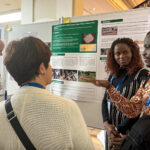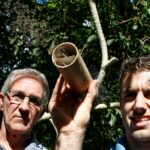
Blog: The Challenges of GMO Detection and Traceability in a Globalized Food System
By Joseph Opoku Gakpo and Modesta Abugu | The traceability and detection of biotech foods in a globalized system remain crucial, and while detection methods have improved, many challenges remain, especially for products of new genomic methods like CRISPR....
Blog: Impressions from the field: biotechnology, scale, and change
By Asa Budnick and Jill Furgurson | Over the summer of 2022, the last cohort of AgBioFEWS graduate students conducted field research in eastern North Carolina, gaining insights into the intersection of biotechnology, farm size, and environmental shifts on farmers....Continue reading "Blog: Impressions from the field: biotechnology, scale, and change"

Blog: Reflections on COP15
GES members attended the recent UN biodiversity conference to better understand the impacts of biotechnology on biodiversity and conservation....
Blog: Archea, Microbial Superheroes?
Jabeen Ahmad, September 27, 2022 | Food insecurity is a concern now and in the future. Globally, the United Nations estimates that about 690 million people are food insecure. By the year 2050, the world population is expected to reach nine billion people, requiring food supplies to double. ...
Blog: Considerations for developing GMO crops around the world
Agriculture is changing and so are the technologies needed to improve it. Scientists should be allowed to develop genetically modified (GM) crops to provide options for smallholder farmers who depend on a successful harvest for their livelihood. That position was highlighted in a panel discussion featuring biotechnology leaders at the Genetics Engineering and Society colloquium organized by the third cohort of the AgBioFEWs fellowship. The question that informed this colloquium was, who makes the decision on which GM crops are developed around the world?...Continue reading "Blog: Considerations for developing GMO crops around the world"

Genetically modified mosquitoes could be released in Florida and Texas beginning this summer – silver bullet or jumping the gun?
Jennifer Kuzma, June 3, 2020 | Release of GM mosquitoes in Florida is imminent. But a multidisciplinary team of scientists believe that more studies are needed first. They encourage a publicly accessible registry for GM organisms....
Can genetic engineering save disappearing forests?
Jason Delborne, January 18, 2019 | Forests in the US face many threats: climate change, invasive species, pests and pathogens. Could genetically engineering trees make these plants more resilient?" ...Continue reading "Can genetic engineering save disappearing forests?"

Podcast: Regulate This!: How Genetic Engineering is Regulated, with Jennifer Kuzma
Podcast - Regulate This!: How Genetic Engineering is Regulated Dr. Jennifer Kuzma from NC State walks us through the complicated world of regulations that control how genetically engineering plants and animals make into our world and onto our plates. Really interesting conversation with broad implications for how society regulates complex technologies. Length: 1 hour, 28 minutes...
Gene Drives and Responsible Innovation
It is not often that a new technology is at once hailed as a potential solution to pandemic disease, wildlife conservation and hunger, while also being feared as a potential military and environmental “bioweapon.” Gene drives,...
Jason Delborne appointed to National Academies Forest Biotech Study Committee
Dr. Jason Delborne has been appointed to the National Academies of Sciences provisional committee on The Potential for Biotechnology to Address Forest Health, or Forest Biotech Study. The study will be looking at the potential uses of biotechnology to mitigate threats to forest tree health, identify ecological, ethical, and societal implications of using this technology in forests, and develop an agenda to address knowledge gaps in its application. ...Continue reading "Jason Delborne appointed to National Academies Forest Biotech Study Committee"

2012-13 Colloquia
Join the Conversation! Colloquium is held Tuesdays at 12pm in the 1911 Building, room 129. Contact Jason Delborne at jadelbor@ncsu.edu for more information....
2013-14 Colloquia
Join the Conversation! Colloquium is held Tuesdays at 12pm in the 1911 Building, room 129. Contact Jason Delborne at jadelbor@ncsu.edu for more information....
2014-15 Colloquia
Join the Conversation! Colloquium is held Tuesdays at 12pm in the 1911 Building, room 129. Contact Jason Delborne at jadelbor@ncsu.edu for more information....
2015-16 Colloquia
Join the Conversation! Colloquium is held Tuesdays at 12pm in the 1911 Building, room 129. Contact Jason Delborne at jadelbor@ncsu.edu for more information....